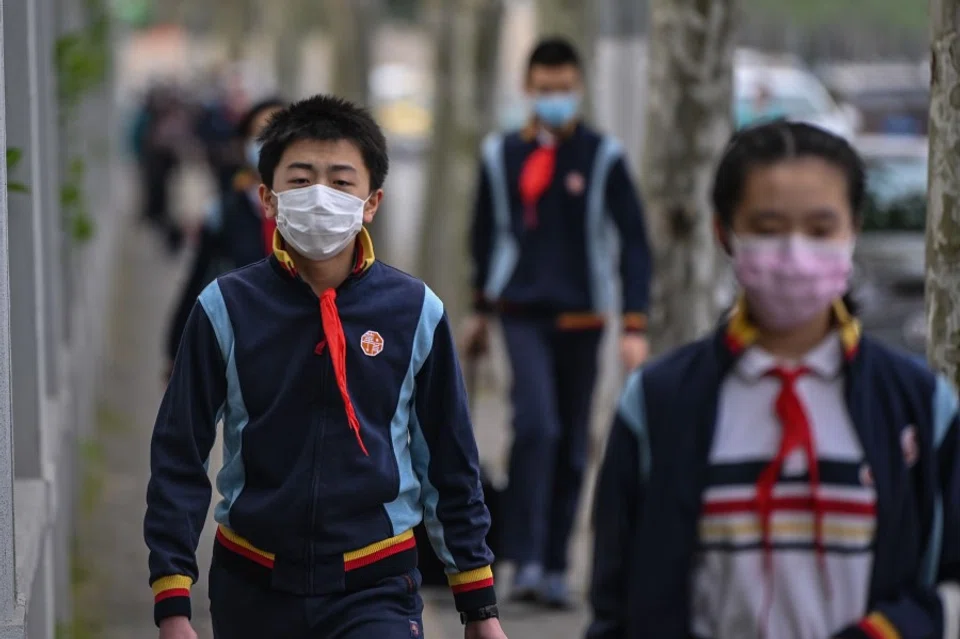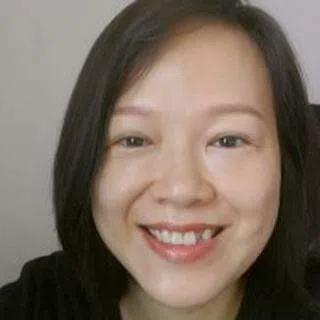'Mother hens' in China: A phenomenon of East Asian attitudes to education?
Schools in China have been gradually re-opening in the last few weeks. "Mother hens" or parents who fuss over their children's education, had their work cut out during the months of lockdown and their trials with home based e-learning. But most of them have taken it in their stride as they are used to coping with major anxiety amid growing pressure in their children's education that begins even before kindergarten. And the same goes for the "tiger mums" of South Korea, Singapore and elsewhere. Zaobao reporter Zeng Shi takes a closer look at the "mother hen" phenomenon in China.

"Is an English vocabulary of 1,500 words sufficient for a four-year-old?"
"Depends on where you are. In the US it's good enough, in China it's not."
This perplexing meme circulating among my WeChat friends brings out the collective anxiety of China's parents - fearful that their children will get a poor start in life, everyone starts running earlier.
Even before the kindergarten holiday begins, Zhang Jieru has conscientiously put up a schedule of lessons for her child during the winter holidays.
"Piano, dance, and English are Xiaomin's regular lessons, so apart from a few days during the Chinese New Year, we try not to interrupt them. Her hanyu pinyin (Chinese phonetics) and arithmetic are rather weak, so we need to give her extra lessons in the winter holidays," Zhang says, pointing to the schedule on the wall.
Zhang's daughter Xiaomin goes to kindergarten in Guangzhou, and will enter primary one in autumn this year. But already this six-year-old is no stranger to rushing to tuition centres and having a packed lesson schedule. She is not alone - she always finds her friends from kindergarten at these extra-curricular lessons.
"More than half of my classmates learn an instrument outside of school. If it's not piano, it's the violin. They also have to take a lot of lessons, like me," Xiaomin shares with solemn innocence.
Maybe this child has already concluded that this is the way things should be.

While Xiaomin learns English from a foreign teacher at her tuition centre, elsewhere in Guangzhou Nansha, third-year senior high school student Deng Xiaoyu is taking sketching and oil painting classes at an art centre.
According to Xiaoyu's father Deng, his son did not do well in his humanities subjects, hence Deng and his wife decided to push him to develop art-making skills, because students with artistic skills and talents enjoy lower academic bars in the university entrance exams, or gaokao (高考).
Fortunately, Xiaoyu likes art. Even so, Deng has hired home tutors to improve Xiaoyu's English and humanities subjects. Deng says worriedly, "Even if you are a 'special talent' student, you do not want your failure in the humanities to be a stumbling block to get into the top universities."
"Mother hens" common in cities
There is an internet term in China to describe the efforts of parents such as Zhang and Deng, who want their children to make it in life - 鸡娃 (ji wa, literal meaning "chicken/hen" and "baby/child", or roughly being a "mother hen" to one's children).
Mother hens are common in China's major cities, especially the first-tier cities of Beijing, Shanghai, Guangzhou, and Shenzhen. The "free-range" parenting style of the previous generation is no more, and anxiety over education is rising sharply, prevalent among middle-class households.
Zhang says, "The competition starts in kindergarten. No, in fact, the foundations are laid at the early education classes before kindergarten."
Last year's popular TV drama A Little Reunion (《小欢喜》) portrays a classic mother hen. The character Song Qian is a single mother to her daughter, a third-year senior high school student. Despite the fact that the girl is already top of the class, Song remains high-strung and puts all her attention on her daughter, coming up with learning plans and rejecting all activities that might affect the girl's studies. To prevent her daughter from being distracted, she installs soundproof walls at home and subsequently even switches to glass walls so as to monitor her daughter's movements. However, her high-pressure parenting eventually causes her daughter to suffer a mental breakdown and attempt suicide.

More "mother hens" among elite families
Ma Ruiwu, who has over 20 years of experience in childhood education and now heads a kindergarten in Guangzhou's Tianhe district, says the burden on children in Chinese cities is too heavy. Weekends are usually spent rushing from class to class, wearing out children and parents alike.
Ma points out that most parents sign up for classes not because their children want them, but to make up for what they missed out in their own childhood, for example, wanting their children to learn piano or violin because they didn't get to learn an instrument themselves. Children may not be interested in these classes but nonetheless go with their parents' wishes, because they don't want to disappoint them. But these children usually produce mediocre results in class.
Ma's daughter is in primary five, and she has also selected quite a few extra-curricular lessons for the girl. In kindergarten, her daughter took classes in choral singing, drawing, elocution, dance, modelling, guzheng (a string instrument), and weiqi (a board game designed to foster strategic thinking). As her daughter entered primary school and began voicing her opinions, Ma dropped the classes that her daughter did not like. They kept to guzheng, drawing, and weiqi, and added language, math, and English classes.
If even an educator like Ma, with qualifications in higher family education and counselling, is selecting so many extra-curricular lessons for her child, it will take a lot of determination for other parents to remain calm and not join the ranks of the mother hens.
Why be "mother hens"?
What classes to choose and which classes are better are hot topics among parents in China. If you are at a gathering of middle-aged people and cannot find anything to say, asking for tips on how to be a mother hen will be a good bet.
So, why be mother hens? Zhang says, when parents see other children going to various tuition centres and getting something out of it, it is difficult not to fall in line and join in. Besides, the mother hen brigade declares that "the less effort from parents now, the fewer options there will be for the children in the future".

An article on Zhihu says that all children are free-range to begin with, but when one "hen child" appears among them, they see that the "benefits" are enormous. That prompts more "hen children", and when all parents become mother hens, nobody dares to go back to being a free-range parent any more.
The article goes on to highlight that parents will all end up choosing to be mother hens, because good universities are a rare resource, and as long as there is competition, parents will rather be strict than be relaxed.
Competitive mindset part of education
Xiong Bingqi, deputy director of the 21st Century Education Research Institute in Beijing says what lies behind parents' mother hen mindset is anxiety and pragmatism. China's educational values and beliefs have not shifted from a competitive-based education system that aims at nurturing an elite. At the same time, education centres are advocating competition to stoke parents' anxiety, which is why everyone is fighting for a place in the race, starting from childhood.
Xiong notes that in recent years, although China's educational resources have become richer in terms of quantity and quality, good education resources continue to be limited. And if 100 people are all fighting to be among the top, the collective anxiety of China's parents will never go away.
Xiong says education is concerned with an individual's personal growth and improvement and each child should be allowed to develop in multiple aspects. In recent years, there have been calls in China to change the grades-based system of educational assessment in hopes to encourage students' personal development, but this reform seems difficult at the moment.

To "hen" or not to "hen"?
In a mother hen household, there is never enough time and energy to go around. Of course, sufficient economic support is definitely necessary. Zhang has done her sums: Xiaomin's kindergarten fees and extra-curricular lessons cost about 100,000 RMB (S$20,000) a year. Deng Xiaoyu's art classes and drawing materials and so on also cost over 100,000 RMB a year.
And this is just the average figure in Beijing, Shanghai, Guangzhou, and Shenzhen. If the mother hens have higher standards, such as making it into an international school, those costs will be beyond the Chinese middle-class households. However, each household is different, and there are parents who cannot or will not pay the high prices of being mother hens. Some may choose to home-school their children.

From steady to crazy
Among the mother hen brigade, one popular view is that it is necessary to educate oneself before educating one's children, so as to set a good example. Another concept is to guide children towards independent learning and to have a positive attitude, rather than to mother hen them.
But for many parents, there is no end to playing mother hen. Xiong Bingqi explains that many parents start off being quite rational, thinking that they will not be like the others, and genuinely want their kids to have a simple and happy childhood. But many of these parents slowly get crazy too.
This mindset peaks in primary school, because at that stage, parents believe that their children are still filled with potential. By the time the children get to senior high, the mother hen syndrome dies down, as many parents gradually accept that their children are ordinary and cannot match their expectations.
Xiong points out that inappropriate mother hen approaches have hurt a lot of children, and parents have paid a heavy price. If a child is constantly taught to be ahead, but later gives up and gives in, the child may end up concluding that they are a failure and lose their self-confidence. Also, some China parents tell their children that if they do not work hard, they will end up doing "low-class" jobs, which is an equally wrong set of values to impart.
Parents and children journey together
"There is no such thing as a child who cannot become a talent, only parents who do not put in effort." Zhang Jieru believes in that saying, and so a year ago she sold her apartment and bought a small place in Guangzhou's school district. In autumn this year, her daughter will be able to join a first-tier provincial primary school in the area.
Deng Xiaoyu's father is quietly planning dates that he can take leave from work, as he wants to book air tickets and accommodation to the various exam venues around China where his son may take the exams for art schools. He wants to be there for him.
Each child is sprinting towards their future, and their parents are also right there in the arena. This is a journey where parents and children grow and journey together, full of hope, anxiety, disappointment and possible elation.



![[Photos] Fact versus fiction: The portrayal of WWII anti-Japanese martyrs in Taiwan](https://cassette.sphdigital.com.sg/image/thinkchina/3494f8bd481870f7c65b881fd21a3fd733f573f23232376e39c532a2c7593cbc)

